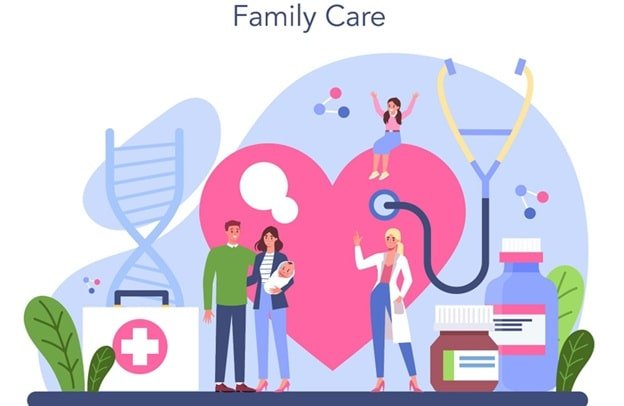Good health is the foundation of a strong and happy family, yet many households only prioritise it when problems arise. Building lasting wellness requires a proactive approach that combines daily habits with protective planning.
Lasting health for your loved ones is not just about preventing illness but also about being prepared for life’s uncertainties. Below are seven practical actions that strengthen your family’s well-being today and secure their future.

7 Smart Health Strategies for Families That Want Long-term Protection
Building lasting family health is about more than quick fixes. By adopting consistent habits and preparing for the unexpected, you create a foundation that keeps your loved ones safe, secure, and resilient over time.
1. Build Nutrition Habits That Last Across Generations
Food is the most basic yet powerful tool for lifelong health. Diet-related conditions are among the top health issues in India, with rising rates of obesity, hypertension, and type 2 diabetes. Families that adopt balanced eating habits early see reduced risks later in life.
Practical Actions:
- Include more seasonal fruits, vegetables, and whole grains in daily meals.
- Limit processed foods, excess sugar, and deep-fried snacks.
- Cook together as a family to build awareness of healthy ingredients and promote a healthy lifestyle.
By creating nutrition-focused habits, you instil values that pass naturally to children, helping them avoid future health complications.
2. Prioritise Preventive Health Check-ups
Preventive screenings are crucial for detecting issues before they become more severe. Conditions like high blood pressure, cholesterol, or thyroid disorders often go unnoticed until severe complications arise. Annual health check-ups help detect risks early, reducing both stress and treatment costs.
Practical Actions:
- Schedule annual health check-ups for all family members.
- Regularly track vital signs, including blood pressure, blood sugar, and cholesterol levels.
- Maintain a household health calendar for vaccinations, dental visits, and eye exams.
Preventive care is often included in health insurance plans, making it both a medical and financial advantage.
3. Secure Financial Protection With Health Insurance
Even with the best lifestyle choices, medical emergencies are unpredictable. A single hospitalisation can set families back financially without proper protection. Choosing a comprehensive health insurance policy provides a safety net for both routine and critical care.
What to Look For:
- Wide coverage for hospitalisation, diagnostics, and outpatient care.
- Cashless treatment options in a strong hospital network.
- Preventive check-up benefits are included in the plan.
Regularly review your plan to ensure it keeps pace with changing health needs and rising medical costs. A health insurance policy allows families to focus on recovery without worrying about draining their savings.
4. Incorporate Mental Health Into Daily Life
Mental health is often overlooked, but it has a direct impact on physical well-being. Stress and burnout can contribute to heart disease, diabetes, and weakened immunity. Families that address mental health proactively enjoy healthier, happier lives together.
Practical Actions:
- Encourage open conversations about stress or anxiety at home.
- Practice mindfulness, meditation, or yoga as a family routine.
- Normalise seeking counselling or therapy when needed.
By integrating mental health into your wellness framework, you reduce the long-term risk of lifestyle diseases and build emotional resilience in your family.
5. Address Specialised Needs With Health Insurance for Parents
Elderly family members often require specialised care. From heart monitoring to age-related conditions such as arthritis or osteoporosis, their medical needs can be frequent and expensive. Relying only on savings for their care may put unnecessary pressure on the household.
Health insurance for parents plays a vital role in family security. These policies are designed to cover pre-existing conditions and critical illnesses, ensuring that seniors receive dignified, reliable, and comprehensive care when they need it most.
Practical Actions:
- Compare policies that include senior citizen benefits.
- Check waiting periods for pre-existing diseases.
- Consider adding options such as domiciliary care or annual screenings to your plan.
This ensures your parents receive the best care while household savings remain protected.
6. Use Technology as a Health Ally
Technology has transformed healthcare access and preventive care. From tracking daily activity to consulting doctors online, digital tools make family health management easier and more reliable.
Practical Actions:
- Use fitness apps or wearables to monitor steps, heart rate, or sleep cycles.
- Adopt telemedicine for quick doctor consultations, saving both time and money.
- Store medical records digitally for faster access during emergencies.
By leveraging technology, you can bridge access gaps, reduce treatment delays, and enhance health management consistency.
7. Create a Family Health Emergency Plan
Preparedness is as important as prevention. Emergencies, such as accidents, sudden illnesses, or natural disasters, demand clear and prompt responses. Without a plan, families often lose critical time during such moments.
Practical Actions:
- Maintain a first-aid kit and keep emergency contact numbers readily available at home.
- Develop a family protocol outlining the steps to take during medical emergencies.
- Share responsibilities with family members, such as who will handle transport, documents, or communication.
This structured approach ensures that during a crisis, your family can act calmly and effectively, minimising damage and stress.
Building lasting health for your loved ones is never about a single effort but a series of consistent steps. Preventive habits, such as good nutrition and mental wellness, create a strong foundation for overall well-being.
Alongside this, protection through health insurance and specialised plans such as health insurance for parents strengthens your family’s safety net. The way forward is simple: take one meaningful step today and build resilience for a healthier, more secure tomorrow.

